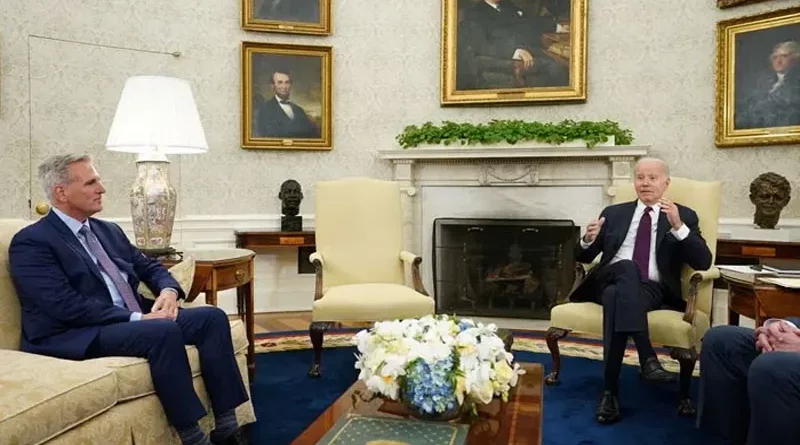Biden, McCarthy start urgent debt talks as default deadline nears
President Joe Biden and congressional leaders engaged in urgent talks on Tuesday to address the deadlock over raising the US debt limit, which is a staggering $31.4 trillion. Failure to reach an agreement could lead to an unprecedented default within three weeks, posing severe consequences for the country. With both sides showing reluctance to make concessions, Biden, accompanied by top lawmakers, met in the Oval Office to tackle this critical issue.
Biden, a Democrat, refrained from making comments during the meeting, jokingly stating that they would “solve all the world’s problems” without entertaining questions. The leaders were seated along party lines, with Republicans Kevin McCarthy and Mitch McConnell on one couch, and Democrats Hakeem Jeffries and Chuck Schumer on the other, while Biden occupied a chair between them. Joining Biden were five senior aides, including Chief of Staff Jeff Zients and budget director Shalanda Young.
Economists warn of dire consequences if a prolonged default were to occur, including a deep recession, high unemployment, and destabilization of the global financial system reliant on US bonds. Investors are preparing for potential impacts. Biden urges lawmakers to raise the debt ceiling without conditions, while McCarthy insists on spending cuts to address the budget deficit. The differing views and heightened political divisions make the current situation riskier than previous debt ceiling battles.
The meeting held significant importance, as the June 1 deadline approached when the US Treasury projects a potential default on certain debts. McCarthy, facing a slim majority in the House, aims to link the debt ceiling vote to broad spending cuts, a stance that the White House considers extreme. Notably, this was Biden’s first meeting with McCarthy since February 1.
The US Chamber of Commerce, the largest business association in the country, called for a swift bipartisan agreement on the debt limit, emphasizing the need for energy project permitting reform and discretionary spending caps. Unlike many countries, the US periodically lifts the borrowing limit to cover previously authorized spending by Congress.
While the start of active talks may provide some reassurance to investors, concerns remain. Treasury bills experienced price declines as investors sold off debt that could mature around the time the debt limit is reached. With Biden’s foreign travel plans and scheduled recesses for the House and Senate, there are limited days for all parties to convene before June 1.
Treasury Secretary Janet Yellen has warned about the devastating impact on the US economy and the dollar’s weakening as the world’s reserve currency if the debt limit is not raised. As the Treasury’s cash reserves dwindle and extraordinary measures are depleted, the urgency to find a solution grows. While the White House has explored the option of Biden invoking the 14th amendment of the US Constitution to lift the debt limit, the president has not yet pursued this path.
The ongoing negotiations hold significant implications for the US economy, global financial stability, and the functioning of the government. The outcome of these talks will determine whether the country averts a default and provides insight into the ability of political leaders to find common ground on critical fiscal matters.

